BOC seized only P2.5B in smuggled goods–report

From 2002 to 2011, the government lost more than P1.33 trillion in revenue due to smuggling through the country’s ports, according to the Federation of Philippine Industries. Smugglers employed the “same old modus operandi,” or the undervaluation, misdeclaration, misclassification and diversion of shipments. AFP FILE PHOTO
MANILA, Philippines—The Bureau of Customs (BOC) last year seized only P2.5 billion worth of illegally imported goods.
In its 2013 accomplishment report, the BOC noted that “smuggling—whether by outright entry of contraband goods or technically by cheating on valuation, weight or misdeclaration—continues to fester at various ports, causing harm to local industries, manufacturers and to our people, not to mention revenue loss for the government.”
The Aquino administration has estimated at P200 billion the annual government revenue losses from smuggling at various ports nationwide.
The bureau’s “Top 10” list of seized smuggled goods included shipments of rice worth P1.2 billion; counterfeit products, P621.95 million; vessels, P150 million; medicines, P62.7 million; motor vehicles, P50 million; ukay-ukay or used clothing, P33.7 million; foodstuff, P32.7 million; other items violating the Intellectual Property Rights Law, P30 million; steel, P23.5 million, and sugar and other agricultural products, P14.5 million.
In its accomplishment report, which is posted on the bureau’s website, the BOC said agents from its Intelligence Group (IG) seized a total of 132 rice shipments last year.
It said the agency “scored its biggest victory” so far against rice smugglers when the IG seized 1,169 containers loaded with 600,000 sacks of rice, with an assessed value of P1.2 billion in May 2013 at the Port of Cebu.
“The rice shipment from Vietnam was misdeclared as stone and granite slabs, as well as cooling insulators,” the report said.
Also last year, IG agents seized 94,000 sacks of Vietnamese rice worth P135 million at the Port of Legazpi and another P10 million worth of smuggled Taiwanese rice in Cebu.
“While the seizure of several illegal rice shipments accounted for most of the apprehensions in terms of value, rice was just one of the many commodities found to have been smuggled into the country. Also seized during the same period were dozens of illegal shipments of other agricultural products like sugar, onion and garlic,” the report said.
Meanwhile, “substandard and untested food items and other regulated commodities, toxic chemicals and dangerous drugs apprehended by the Customs Intelligence and Investigation Service could have entered the underground market,” it said.
The BOC credited its X-ray Inspection Project for the detection of many misdeclared items, such as motorcycles labeled as “used household items” or “personal items”; used tires declared as “used washing machines,” and flat screen TVs and refrigerators declared as “used truck parts.”
In 2013, the bureau delisted 859 traders and brokers for violations of various customs rules and regulations.
“Cleaning the list of suspicious and fictitious companies required removing some (rice) cooperatives and firms granted rice importation quotas by the National Food Authority,” it explained.
The delisting was made following a review of the financial status of these firms and the physical inspection of their business addresses, warehouses and operations, the BOC said.
Of the 13,321 applications for import accreditation it received last year, the BOC approved 12,784.
Last year, the BOC filed another 43 smuggling cases against erring traders and brokers, bringing to 158 the total of such cases filed during the Aquino administration.
At a recent meeting with traders and other customs stakeholders at the Development Bank of the Philippines, Customs Commissioner John Phillip Sevilla reported that more than six months after the government initiated reforms at the bureau, there was still “rampant” smuggling at various ports nationwide.
According to the newly appointed Sevilla, the bureau had to deal with “systems that do not work and where processes are still done manually, a working environment that is inefficient and something that makes it easy for corruption.”
RELATED STORIES
Gov’t lost P1.3T to smugglers in 9 years
